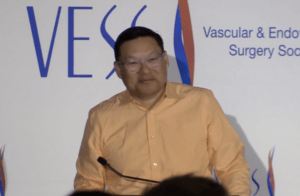
Themes rooted in the life of Achilles, the heroic figure from Greek mythology, and the concept of “emotional stamina” underpinned the message delivered from the presidential podium during the 2022 winter annual meeting of the Vascular and Endovascular Surgery Society (VESS).
The specter of Achilles has loomed large over the life and times of the man behind the message. In recent years, Jason Lee, MD, the now immediate past president of VESS and an active sportsman, has suffered two ruptures of his Achilles tendon. Taking inspiration from the legend of Achilles’ exertions during the Trojan War, Lee drew on both the warrior and leadership characteristics Greek mythology bestows on Homer’s central hero of the Iliad to illustrate character traits redolent of progress and recovery during the 2022 VESS Presidential Address.
“His swiftness was what made him a great warrior,” Lee told the VESS gathering in Snowmass, Colorado (Jan. 27–30). “The ability to get in and out of trouble quickly, to make quick decisions and move swiftly.” But demigod Achilles also had human traits, he continued, including deep loyalty to family and friends. Perhaps like a lot of young vascular trainees, Lee suggested, he began as slightly angry and impulsive. “But perhaps like most of our trainees who have gone on to be wonderful junior faculty and senior faculty, he adapted.”
Achilles progressed through a well-described leadership improvement as he rose through the ranks, Lee explained. Battle after battle, or “surgery after surgery,” he said, Achilles was undefeated—“even though the larger war that we all stage every day at the hospital was perhaps at a stalemate.”
His eventual retreat from war, subsequent return to the fray and ultimate death were tied up in conflict with higher leadership, a failing plan B, as well as vengeance and loyalty. Crucially, the arrow that would claim his life— Achilles’ heel— Lee informed his audience, is shrouded in much mystery and debate. But for Lee, the key to the answer, and the inherent lesson, may lie in scholarly literature that focuses on the warrior’s “imperfect” vulnerability. “Despite whatever armor we put on,” he said, “all of us have that vulnerability, and embracing it perhaps is the best way to adapt to the day-to-day issues we come up with,” he related.
Those Achilles ruptures Lee himself suffered in the last half decade offered up personal trajectories of progress and recovery: “Armed with a continued desire to compete, and even after a second rupture a year later,” the Stanford vascular chief and competitive tennis player told VESS, “[it was] back to the OR [operating room], back to the tennis courts—it turns out these bilateral Achilles ruptures happen with some frequency: and we’re back to everything. This was [about] overcoming the inability to recover physically, and then realizing the emotional recovery necessary for it.”
Lee asked VESS attendees to consider their own Achilles ruptures, and to consider lessons to be derived from the warrior’s legend. Fierce devotion to protect as well as sponsor the next generation. A warrior’s mentality of battle strategy and teamwork, as in the OR and clinics. Loyalty and dedication to causes and movements. Recognizing strengths can be weak points, and vice versa. That it’s okay to be vulnerable. That leftfield ideas can change history. To remember to respect those who came before. Just as he had when faced with those ruptures, “climb the mountain, and then do it again.” And weather the storm in the spirit of “emotional stamina.”
Back during VESS 2016, Lee could be seen wheeling around the conference venue on a scooter having incurred the first of those Achilles ruptures. Back then, it soon dawned on him the significance of the moment, he told Vascular Specialist a few days after giving the 2022 VESS Presidential Address. “It was compelling the idea of how indestructible we all like to think we are in trying to put on a strong vascular surgery face for our patients, for our colleagues, for our trainees,” he said. “But we actually all need to have a lot of self-introspection about our own vulnerabilities. Rather than think of those things as weaknesses, we should actually embrace when we’re in those times and turn them into moments of change, innovation and creativity—and make good of them.”












